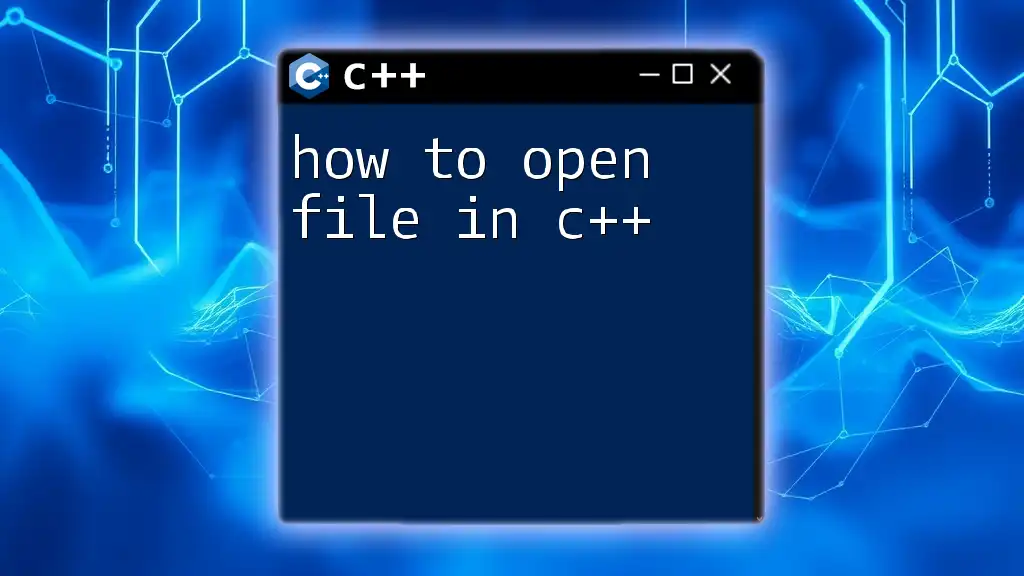In C++, you can convert an integer to a double by simply assigning the integer variable to a double variable, as shown in the example below:
int intValue = 42;
double doubleValue = intValue; // Implicit conversion from int to double
Understanding Data Types in C++
What are Primitive Data Types?
In C++, primitive data types are the basic building blocks of data manipulation. Two of the most commonly used primitive types are `int` and `double`.
-
int: This data type is used for storing integer values. It carries a range that typically spans from -2,147,483,648 to 2,147,483,647 on a 32-bit system (though this can vary depending on system architecture).
-
double: This represents double-precision floating-point numbers. It can store a significantly larger range of values, including fractions, which makes it essential for calculations requiring more precision.
Why Convert int to double?
Converting an `int` to a `double` provides several benefits. Type conversion is critical when performing arithmetic operations that involve different data types. For example, dividing an `int` by another `int` results in an integer. However, if you want to obtain a precise decimal result, you need to convert at least one `int` to a `double`. This is particularly important in scenarios where accurate calculations are paramount, such as in financial applications or scientific computations.

Methods to Convert int to double in C++
Implicit Conversion
Implicit conversion is a process where the compiler automatically changes one type to another.
For instance, during an arithmetic operation, if you add an `int` to a `double`:
int a = 5;
double b = 10.5;
double result = a + b; // Implicit conversion occurs here
In this example, `a` is implicitly converted to a `double` before the addition, allowing you to obtain a floating-point result.
Explicit Type Casting
When you want more control over type conversion, you can use explicit casting methods.
What is Type Casting?
Type casting allows you to convert one data type into another actively. Let's explore its forms:
Using C-style Casting
C-style casting is a straightforward approach using parentheses. Here's a syntax example:
int a = 12;
double b = (double)a; // C-style cast
This method works, but it's less safe because it doesn't convey intent as clearly compared to C++ casting operators.
Using C++ Casting Operators
C++ provides more robust casting operators, such as `static_cast`, which offer type safety and clarity.
Example:
int a = 20;
double b = static_cast<double>(a); // C++ casting
Using `static_cast` explicitly states your intent to convert the variable from `int` to `double`, making your code cleaner and more maintainable.

Key Considerations When Converting
Precision and Accuracy
While converting `int` to `double`, it's vital to consider the implications on precision. Double-precision floating-point representation can lead to inaccuracies, especially in calculations that require high precision. For instance, when dealing with monetary values, rounding errors can accumulate. Hence, always evaluate the precision needs of your specific application.
Range of Values
It's essential to be aware of the range of values `int` and `double` can hold. A double can represent larger numbers, but when an integer surpasses the limits of its type, converting it could lead to data loss or unexpected behavior. It's always prudent to assess if the integer value can be accurately represented as a double.

Common Mistakes to Avoid
Misunderstanding Implicit vs Explicit Conversion
A common misunderstanding arises with implicit conversions. Developers may assume the results are always what they expect. For instance, dividing two integers:
int a = 5;
int b = 2;
double result = a / b; // This will result in 2.0, not 2.5
In this case, because both operands are integers, the division results in integer division. To ensure you get a double result, at least one variable must be explicitly converted.
Ignoring Data Loss Risks
For large integers approaching `double` limits, caution is essential. Converting an integer that exceeds `double` precision can lead to inaccuracies or data loss. Always validate your data before performing operations or conversions.

Performance Implications of Conversion
Efficiency in Conversion
When it comes to conversion methods, implicit conversions are generally more efficient because they are automatically handled by the compiler. However, longer code involving multiple conversions may require explicit type casting to maintain clarity and reduce possible bugs.
Impact on Performance
In applications with heavy arithmetic operations, frequent conversions may pose a performance penalty. While for typical scenarios the difference is negligible, it's important to be judicious, particularly in performance-critical applications.

Practical Applications
Real-World Use Cases
There are numerous scenarios where converting `int` to `double` plays a crucial role. In financial applications, ensuring that interest calculations are accurate mandates this conversion. Similarly, in gaming, where scores often get mixed with percentages, ensuring precision through this conversion can enhance user experience.
Code Snippet Demonstrations
Consider a basic example in a financial context for calculating interest:
int principal = 2000;
double rate = 0.04; // Annual interest rate as a fraction
double interest = (double)principal * rate; // Calculating interest
In this snippet, converting `principal` to a double ensures that the computation involves actual decimal representation, leading to an accurate result.

Conclusion
Understanding how to convert int to double in C++ is an essential skill every programmer should master. It not only facilitates accurate calculations in various contexts but also serves as a foundation for more complex data manipulations in programming. Remember to practice frequently and simulate real-world scenarios to sharpen your skills in type conversion.

Additional Resources
Links to Further Reading
For those interested in diving deeper into C++ data types and type conversion, there are numerous resources available online, including C++ documentation, programming forums, and coding tutorial sites.
Coding Challenges
Consider exploring platforms like LeetCode or Codecademy where you can find challenges specifically revolving around data types and conversions in C++. These practice problems can significantly enhance your coding skills and understanding.

Call to Action
We encourage you to share this article with fellow coding enthusiasts and to explore additional resources your company provides for mastering C++ commands. Engage in discussions or reach out with any questions to further hone your C++ programming skills.

















